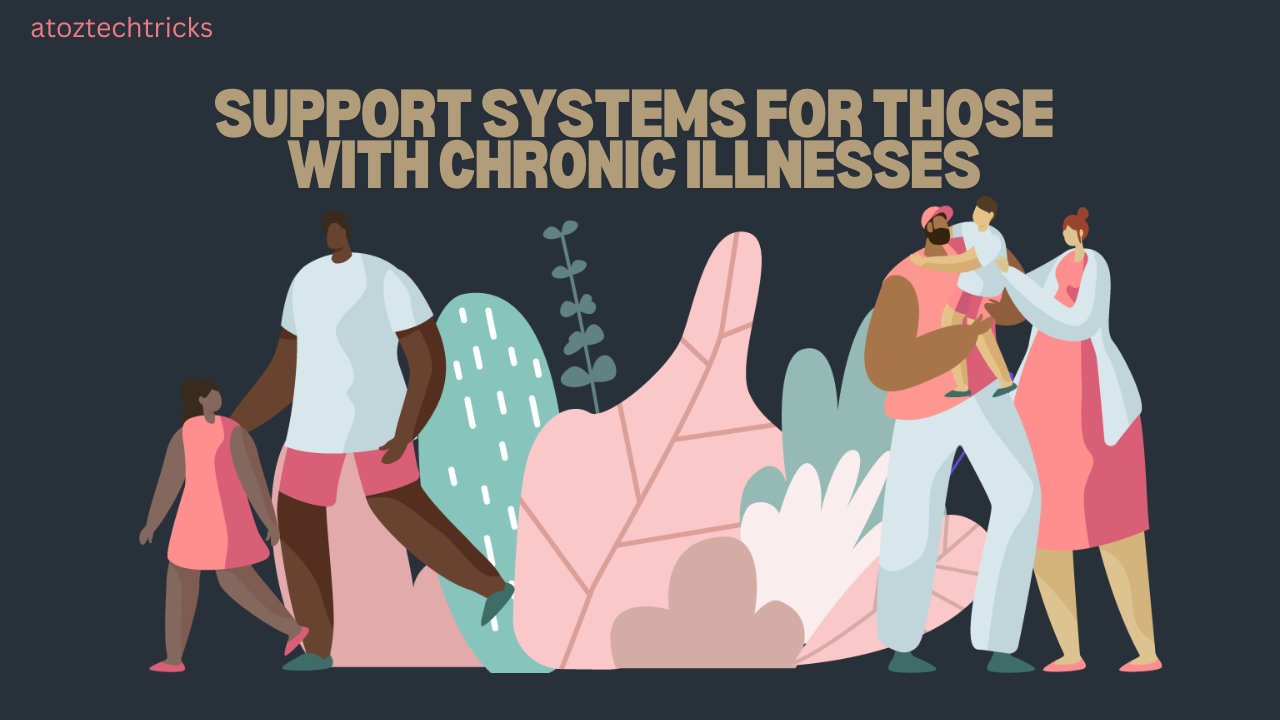Support Systems for Those with Chronic Illnesses: A Comprehensive Guide
Living with a chronic illness can be an ongoing challenge that affects not just physical health but also emotional and psychological well-being. Support systems are vital in managing these challenges, providing individuals with chronic conditions the tools and resources they need to navigate daily life. This comprehensive guide explores the various types of support systems available, including healthcare providers, family and friends, support groups, and community resources. We’ll also discuss strategies for building and utilizing these support networks effectively.
1. Healthcare Providers
Overview
Healthcare providers are central to managing chronic illnesses. They offer medical treatment, guidance, and support to help patients manage their conditions and improve their quality of life.

Types of Healthcare Providers
- Primary Care Physicians (PCPs): Serve as the first point of contact for managing chronic conditions. They coordinate care, offer treatment plans, and refer patients to specialists if needed.
- Specialists: Provide focused care for specific chronic conditions, such as endocrinologists for diabetes or rheumatologists for rheumatoid arthritis. Specialists offer expert advice and advanced treatment options.
- Nurses: Play a crucial role in patient education, monitoring health status, and providing emotional support. They often work closely with patients to manage medication regimens and lifestyle adjustments.
- Pharmacists: Assist with medication management, including dosage, side effects, and interactions. They can also provide advice on over-the-counter medications and supplements.
- Mental Health Professionals: Include psychologists, psychiatrists, and counsellors who help patients cope with the emotional and psychological impact of chronic illness. They offer therapy, counselling, and support for mental health conditions.
Why It’s Important
Healthcare providers offer the clinical expertise necessary to manage chronic illnesses effectively. They help patients understand their conditions, develop treatment plans, and address any medical or psychological issues that arise. Building a strong relationship with healthcare providers can enhance the quality of care and improve patient outcomes.
2. Family and Friends
Overview
Family and friends play a significant role in the support system for individuals with chronic illnesses. They provide emotional support, practical assistance, and companionship, helping to alleviate the burden of managing a chronic condition.
Types of Support from Family and Friends
- Emotional Support: Offering a listening ear, encouragement, and understanding. Emotional support helps individuals feel valued and less isolated.
- Practical Assistance: Helping with daily tasks such as cooking, cleaning, transportation to medical appointments, or managing medications. This support can ease the physical and logistical challenges of living with a chronic illness.
- Advocacy: Assisting with navigating the healthcare system, advocating for the patient’s needs, and ensuring they receive appropriate care and accommodations.
- Companionship: Providing social interaction and reducing feelings of loneliness. Engaging in activities together can improve the individual’s overall well-being and mood.
Why It’s Important
Family and friends offer a personal support network that can significantly impact the emotional and practical aspects of managing a chronic illness. Their involvement can help individuals feel more connected, supported, and empowered to manage their health.
3. Support Groups
Overview
Support groups bring together individuals with similar chronic conditions to share experiences, offer advice and provide mutual support. These groups can be in-person or online, and they offer a sense of community and understanding.
Types of Support Groups
- In-Person Support Groups: Meet regularly in community centres, hospitals, or other local venues. These groups offer face-to-face interactions and the opportunity to build personal relationships.
- Online Support Groups: Accessible via forums, social media, or dedicated websites. They provide flexibility and can connect individuals from different geographical locations.
- Condition-Specific Groups: Focus on specific chronic illnesses, such as diabetes or multiple sclerosis. These groups offer specialized advice and support tailored to the particular challenges of the condition.
- General Chronic Illness Groups: Address broader issues faced by individuals with various chronic conditions, providing general support and coping strategies.
Why It’s Important
Support groups offer a sense of belonging and understanding that can be difficult to find elsewhere. They provide valuable information, emotional support, and practical advice from people who have firsthand experience with similar challenges. Participation in support groups can enhance coping skills and provide a platform for sharing strategies and resources.
4. Community Resources
Overview
Community resources offer a wide range of services and support to individuals with chronic illnesses. These resources can include financial assistance, educational programs, and social services.

Types of Community Resources
- Nonprofit Organizations: Many organizations focus on specific chronic illnesses or general health issues. They provide resources such as educational materials, support services, and financial assistance.
- Social Services: Offer support such as meal programs, transportation services, and home health care. Social workers can help individuals access these services and navigate the complexities of managing a chronic illness.
- Educational Programs: Include workshops, seminars, and classes on managing chronic conditions, healthy living, and coping strategies. These programs can empower individuals with knowledge and skills to manage their health effectively.
- Financial Assistance Programs: Provide help with medical costs, prescription medications, and other expenses related to chronic illness. Programs may be offered through government agencies, nonprofit organizations, or community foundations.
Why It’s Important
Community resources can provide essential support and services that enhance the overall quality of life for individuals with chronic illnesses. They offer practical assistance, educational opportunities, and financial relief, helping to address the multifaceted challenges of managing a chronic condition.
5. Self-Management Strategies
Overview
Self-management strategies involve proactive approaches to managing chronic illnesses on a day-to-day basis. These strategies empower individuals to take control of their health and well-being.
Types of Self-Management Strategies
- Health Monitoring: Keeping track of symptoms, medication use, and other health indicators. Tools such as symptom diaries, health apps, and wearable devices can aid in monitoring and managing chronic conditions.
- Lifestyle Adjustments: Implementing changes to diet, exercise, and daily routines to manage symptoms and improve overall health. Tailoring these adjustments to individual needs can enhance their effectiveness.
- Stress Management: Incorporating techniques such as mindfulness, relaxation exercises, and therapy to reduce stress and improve emotional well-being. Managing stress can have a positive impact on physical health and symptom control.
- Education and Advocacy: Staying informed about the chronic condition, treatment options, and healthcare resources. Being knowledgeable empowers individuals to make informed decisions and advocate for their needs effectively.
Why It’s Important
Self-management strategies empower individuals to take an active role in their health care. By adopting effective self-management practices, individuals can improve their quality of life, manage symptoms more effectively, and reduce their reliance on external support systems.
6. Technology and Digital Tools
Overview
Technology and digital tools offer innovative ways to support individuals with chronic illnesses. These tools can enhance communication, provide information, and facilitate self-management.
Types of Technology and Digital Tools
- Telemedicine: Allows patients to consult with healthcare providers remotely via video calls or phone. Telemedicine can increase access to care, particularly for individuals with mobility issues or those living in remote areas.
- Health Apps: Offer features such as symptom tracking, medication reminders, and educational resources. Apps can help individuals manage their health more effectively and stay organized.
- Wearable Devices: Include fitness trackers and smartwatches that monitor health metrics such as heart rate, activity levels, and sleep patterns. These devices can provide valuable data for managing chronic conditions.
- Online Communities: Provide forums and social media groups where individuals can connect, share experiences, and seek advice. Online communities offer support and a sense of belonging.
Managing Symptoms and Flare-Ups: Strategies for Effective Relief
Why It’s Important
Technology and digital tools can enhance the management of chronic illnesses by providing convenient access to information, care, and support. They offer innovative solutions for monitoring health, staying connected with healthcare providers, and engaging with supportive communities.
7. Legal and Financial Support
Overview
Legal and financial support can help individuals with chronic illnesses manage the economic and legal challenges associated with their conditions.
Types of Legal and Financial Support
- Disability Benefits: Government programs such as Social Security Disability Insurance (SSDI) or Supplemental Security Income (SSI) provide financial assistance to individuals who are unable to work due to chronic illness. Navigating the application process can be complex, and assistance from advocacy organizations or legal professionals may be necessary.
- Insurance Coverage: Health insurance, disability insurance, and other policies can help cover medical expenses and provide financial protection. Understanding and utilizing insurance benefits can alleviate some of the financial burdens of chronic illness.
- Legal Advocacy: Legal professionals can assist with issues related to employment rights, disability accommodations, and other legal matters. Advocacy organizations may offer resources and support for navigating legal challenges.
Why It’s Important
Legal and financial support helps individuals with chronic illnesses address the economic impact of their conditions. By accessing disability benefits, insurance coverage, and legal assistance, individuals can reduce financial stress and focus on managing their health.
8. Building a Support System
Overview
Creating a robust support system involves identifying and connecting with various resources and individuals who can offer assistance and encouragement.
Strategies for Building a Support System
- Identify Needs: Assess the specific support needs related to your chronic illness, including medical care, emotional support, and practical assistance. Understanding your needs will help you identify the appropriate resources and support networks.
- Engage with Healthcare Providers: Build strong relationships with healthcare providers who can offer medical expertise and guidance. Regular communication and collaboration with your care team are essential for effective management of your condition.
- Connect with Family and Friends: Communicate openly with loved ones about your needs and how they can support you. Encourage their involvement and discuss ways they can help with practical tasks and emotional support.
- Join Support Groups: Participate in support groups to connect with others who have similar experiences. Share your challenges and successes, and seek advice and encouragement from peers.
- Utilize Community Resources: Explore community resources such as nonprofit organizations, social services, and educational programs. These resources can provide valuable assistance and support.
- Leverage Technology: Use technology and digital tools to manage your health, stay connected with healthcare providers, and engage with online communities.
Why It’s Important
Building a comprehensive support system ensures that you have access to the resources, assistance, and encouragement needed to manage a chronic illness effectively. A well-rounded support system can enhance your quality of life, reduce stress, and improve overall well-being.
Support systems are essential for individuals living with chronic illnesses, offering a combination of medical, emotional, practical, and financial assistance. Healthcare providers, family and friends, support groups, community resources, and self-management strategies all play a crucial role in managing the complexities of chronic conditions. By understanding and utilizing these support systems, individuals can navigate the challenges of chronic illness more effectively and improve their overall quality of life.
Building and maintaining a strong support network requires proactive engagement and communication. Identifying needs, seeking appropriate resources, and connecting with supportive individuals and organizations can significantly impact your ability to manage a chronic illness and lead a fulfilling life. Whether through medical care, emotional support, or practical assistance, the right support system can make a meaningful difference in your journey with a chronic condition.





Post Comment